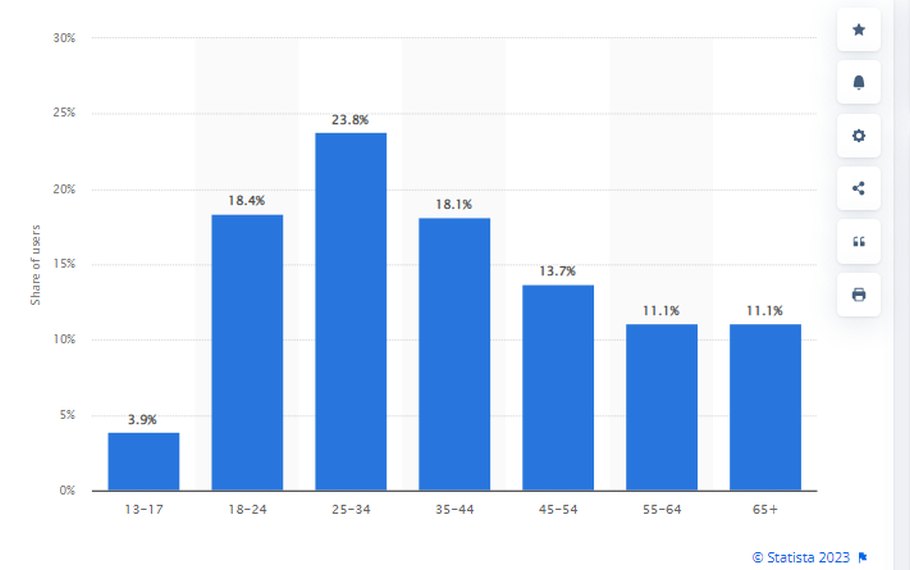Facebook, the once-cool social media platform started by Mark Zuckerberg from a Harvard dorm room in 2004, is slowly going the way of the dinosaurs. Facebook is not dead yet but most of its users are up there in age. Today, 3 billion people check the social media platform each month, which is over a third of the global population. In addition, 2 billion users log in daily.
However, despite this massive user base, Facebook is still facing challenges to remain relevant and secure its future after being in existence for two decades. This is especially more noticeable among younger people who have abandoned the platform for cooler apps like Instagram and Tik Tok.
One of the young adults who have moved on from the social platform is 24-year-old Devin Walsh. “I don’t even remember the last time I logged in. It must have been years ago,” said Walsh, who lives in Manhattan and works in public relations told CBS News.
Walsh has shifted her social media attention away from Facebook and now checks her Instagram app five or six times a day. Additionally, she spends around an hour each day scrolling through TikTok and letting the algorithm find things “I didn’t even know I was interested in.”
Walsh told CBS that she can’t envision a world in which Facebook, which she joined when she was only in 6th grade, becomes a regular part of her life again.
“It’s the branding, right? When I think of Facebook, I think ugh, like cheugy, older people, like parents posting pictures of their kids, random status updates and also people fighting about political issues,” Walsh said, using the Gen Z term to describe things that are definitely not cool or someone who is out of date or trying too hard to fit.
As of March 2023, the largest group of Facebook users in the United States were aged between 25 and 34 years, accounting for 23.8 percent of all users, according to data from Statista. The 18 to 24-year age group made up 18.4 percent of users. Teen users represented the smallest audience, with only around 5 percent of users being aged between 13 to 17 years. Moreover, women were a slightly bigger user group than men on the platform.

Source: Statista
However, the exodus of younger audiences from Facebook is nothing new. The writing has been on the wall since the launch of Instagram and the launch of TikTok in August 2018. The news is filled with headlines such as: “Facebook now ‘officially’ for old people as teens desert it for cooler social networks.” A piece from Vice in 2018 also reads: “What Are Old People Doing on Facebook?” Vice wrote: “The site has never been more popular with over-55s, but what’s going on in their News Feed that they love so much?”
According to Debra Aho Williamson, an analyst with Insider Intelligence who has been tracking Facebook since its inception, the platform has been losing younger users, but she doesn’t think that Facebook will disappear anytime soon, or at least not in the near future.
“The fact that we are talking about Facebook being 20 years old, I think that is a testament of what Mark developed when he was in college. It’s pretty incredible,” she said. “It is still a very powerful platform around the world.”
AOL was once a dominant player in the tech industry, but now it is associated with an aging user base and its email service, aol.com, is often the subject of jokes about people who are not technologically savvy and belong to a specific age group.
Is Facebook the new MySpace?
In the early days of social media, MySpace was another popular platform that launched around the same time as Facebook. However, as time went on, Facebook became the more popular platform among younger users, while MySpace struggled to keep up. To make matters worse, MySpace was acquired by News Corp., which may have contributed to its outdated image.
“It was this weird combination…no one knew how technology worked, but in order to have a MySpace, we all needed to become mini coders. It was so stressful.” Moira Gaynor, 28, told CBS News. “Maybe that’s even why Facebook took off. Because compared to MySpace it was this beautiful, integrated, wonderful engagement area that we didn’t have before and we really craved after struggling with MySpace for so long.”
Looking back in time, it’s very easy to see the parallels between the decline of MySpace and the current situation of Facebook, particularly in terms of losing younger users to newer and trendier platforms. It now appears that Facebook is facing some of the same challenges that led to the decline of MySpace, mainly the loss of younger users to more popular and trendy platforms.
Nonetheless, Facebook has a huge number of users and is making efforts to keep up with the times by acquiring new companies and introducing new features. We’ll have to wait and see whether Facebook will follow in MySpace’s footsteps or find a way to adapt and survive.
- SEO Powered Content & PR Distribution. Get Amplified Today.
- PlatoAiStream. Web3 Data Intelligence. Knowledge Amplified. Access Here.
- Minting the Future w Adryenn Ashley. Access Here.
- Buy and Sell Shares in PRE-IPO Companies with PREIPO®. Access Here.
- Source: https://techstartups.com/2023/05/08/facebook-has-3-billion-users-but-many-of-them-are-old/
- :has
- :is
- :not
- $UP
- 13
- 14
- 20
- 20 years
- 2018
- 2023
- 23
- 28
- 8
- a
- About
- According
- Accounting
- acquired
- acquiring
- adapt
- addition
- Additionally
- adults
- After
- again
- age
- aged
- Aging
- ago
- algorithm
- All
- also
- among
- an
- analyst
- and
- Another
- app
- apps
- ARE
- AREA
- around
- AS
- associated
- At
- attention
- audience
- audiences
- AUGUST
- away
- back
- base
- beautiful
- became
- because
- become
- becomes
- been
- before
- being
- between
- bigger
- Billion
- branding
- but
- by
- challenges
- check
- Checks
- CO
- College
- COM
- Companies
- compared
- contributed
- Cool
- Corp
- Current
- daily
- data
- Date
- day
- Days
- dead
- decades
- Decline
- definitely
- describe
- DESERT
- Despite
- developed
- Devin
- Dinosaurs
- disappear
- Doesn’t
- doing
- dominant
- Dont
- dorm
- each
- Early
- easy
- efforts
- engagement
- envision
- especially
- Even
- Exodus
- facing
- Features
- fighting
- filled
- Find
- fit
- follow
- For
- from
- future
- Gen
- Gen Z
- Global
- going
- grade
- Group
- Hard
- harvard
- Have
- he
- Headlines
- her
- hour
- How
- However
- HTTPS
- huge
- i
- image
- in
- inception
- incredible
- industry
- Insider
- integrated
- Intelligence
- interested
- introducing
- IT
- ITS
- joined
- jpg
- Keep
- kids
- Know
- largest
- Last
- launch
- launched
- least
- Led
- letting
- Life
- like
- Lives
- log
- logged
- Long
- losing
- loss
- love
- made
- mainly
- make
- Making
- many
- March
- mark
- mark zuckerberg
- massive
- Matters
- May..
- Media
- Men
- Month
- more
- Moreover
- most
- much
- must
- Near
- needed
- never
- New
- New Features
- news
- nothing
- now
- number
- of
- off
- often
- Old
- on
- once
- ONE
- only
- or
- order
- out
- over
- Parallels
- parents
- part
- particularly
- People
- percent
- Pictures
- piece
- platform
- Platforms
- plato
- Plato Data Intelligence
- PlatoData
- player
- political
- Popular
- population
- powerful
- pretty
- public
- Public Relations
- random
- really
- regular
- relations
- relevant
- remain
- remember
- represented
- Room
- Said
- same
- savvy
- scrolling
- secure
- see
- service
- she
- shifted
- since
- site
- situation
- SIX
- Slowly
- So
- Social
- social media
- social platform
- some
- Someone
- Soon
- specific
- started
- States
- Status
- Still
- Struggling
- subject
- such
- survive
- talking
- tech
- tech industry
- Technology
- teen
- Teens
- terms
- testament
- than
- that
- The
- the world
- their
- Them
- There.
- they
- things
- think
- Third
- this
- Through
- Tik Tok
- tiktok
- time
- times
- to
- today
- too
- took
- Tracking
- two
- United
- United States
- Updates
- User
- users
- using
- very
- wait
- Wall
- was
- Way..
- we
- were
- What
- when
- whether
- which
- while
- WHO
- why
- will
- with
- Women
- wonderful
- worked
- works
- world
- worse
- writing
- years
- yet
- young
- Younger
- zephyrnet
- Zuckerberg











